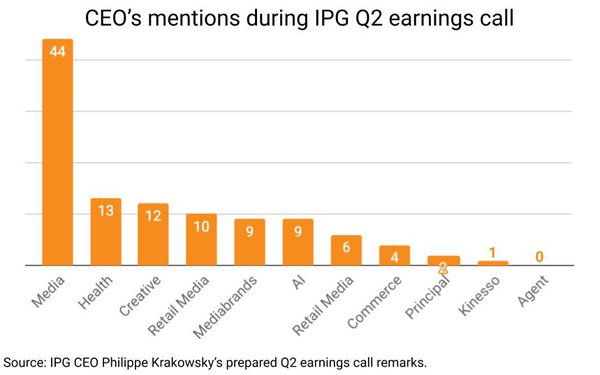
In a wide-ranging earnings call with Wall Street analysts,
Interpublic CEO Philippe Krakowsky touched on many of the ad industry's most topical points -- AI, retail media, commerce, etc. -- but emphasized media, especially the role of IPG Mediabrands, its
burgeoning Kinesso unit, as well as a tacit shift toward principal media-buying.
"Given that marketplace evolution, we have pivoted and are now able to deliver value not only with advanced and
effective media solutions, but also through our growing practice in principal media-buying," Krakowsky said during his prepared remarks, adding, "This new component of our media practice will take
time to scale fully, but represents an incremental option for media value creation for current and prospective clients, as well as a new avenue for growth for what has consistently been our
strongest performing business."
advertisement
advertisement
The reason for the emphasis, he explained later, was that IPG has been slow to move to principal-based media-buying -- the practice of an agency acquiring media
inventory directly from sellers and effectively re-selling it to clients -- relative to the peer holding companies it competes with.
"The challenges we are facing at certain of our agencies,
coupled with the shift in the media landscape to principal-buying, have led to recent losses that will weigh on our results, particularly as we head into 2025," Krakowsky acknowledged.
The
shift to principle media-buying is not actually new, but has gotten the attention of investors, clients and some of the advertising trade press recently, because the ad biz is fond of thinking of
things in terms of "new and improved."
Though it has accelerated with the evolution of digital media, especially big digital media suppliers.
The earliest forms of the modern day ad agency
-- shops like J. Walter Thompson and N.W. Ayer & Sons -- originally began as sales reps selling advertising space for the big media platforms of their era: newspapers.
Over time, the
full-service infrastructure -- including creative services, consumer research, etc. -- evolved and got bundled into the 15% commission system big agencies were originally modeled on.
Over time,
agencies evolved and added other client services, and clients pushed back on the largesse of the 15% commission, negotiating lower percentages and shifting to other agency compensation models,
especially time or labor-based ones, and occasionally, incentive-based ones.
With the rise of big digital media platforms -- especially Google and Facebook (now Meta) -- the biggest agencies
became a minority source of digital ad buys to the long tail of self-serve small and medium size businesses buying it directly, and the platforms began treating big agencies as principals, not agents
in their business models and terms and conditions.
As part of that shift, big agencies did receive new forms of commissions from the big platforms, but they also assumed greater liability
associated with those buys, something many have been working to change.
With the rise of programmatic media-buying, some agencies also began creating new divisions such as WPP's Xaxis, which
acting as explicit principal media-buyers, taking the risk of acquiring real-time advertising inventory and reselling it to clients, effectively becoming arbitragers.
Again, that practice wasn't
entirely new, but accelerated and took on new forms with the advent of digital media and real-time programmatic trading.
But many big agencies historically have created time banks, advancing
cash to help media outlets -- especially TV and radio stations -- with their liquidity in exchange for discounted advertising inventory that they would resell or package to clients.
That said,
there is a renewed perceived push for big agency holding companies to accelerate principal-based media-buying, and Krakowsky's comments today help explain some of the new impetus.
Later in the
call, in response to a question from a securities analyst, Krakowsky attributed IPG's push to the loss of some recent media accounts, citing "a loss of Mediabrands in automotive last year, where
clearly, the nature and the quality of the product was not in question. The premium on efficiency is something that -- as the world becomes more uncertain, and there's been a lot of this pressure on
client P&Ls, the cost of money, this broader uncertainty -- you definitely think [principal buying] will be a benefit.
"We've seen circumstances where late in a process, that's become a
gating item in a decision that obviously didn't go our way."